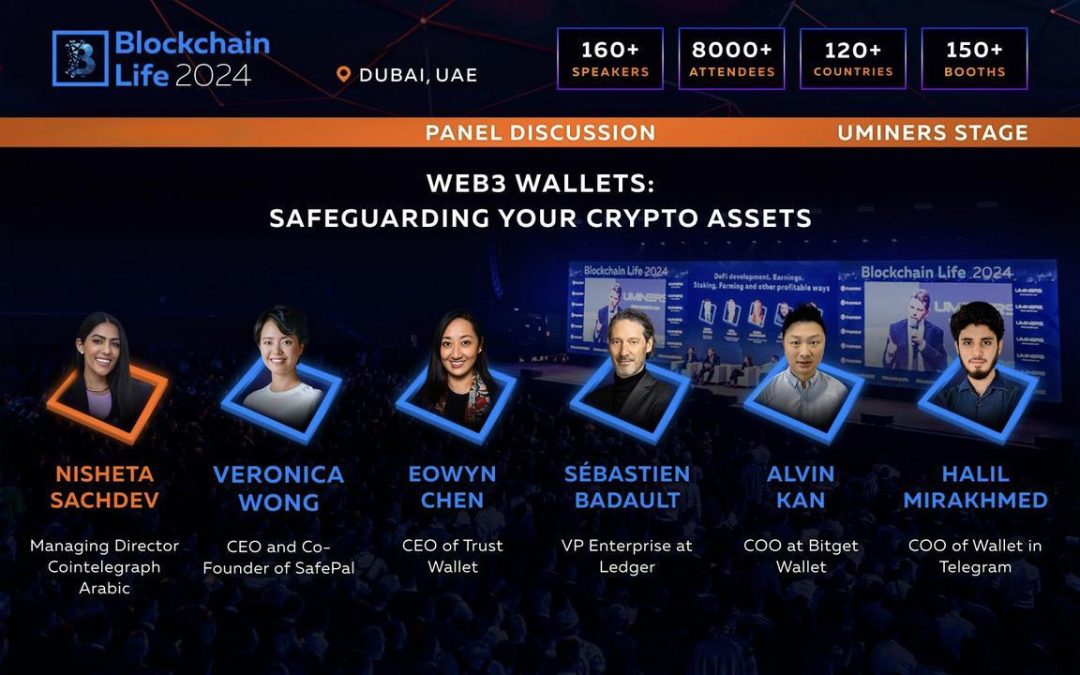Victoria, Seychelles, April 23rd, 2024, Chainwire
At this month’s Blockchain Life Dubai conference, Bitget Wallet‘s Chief Operating Officer Alvin Kan joined industry experts from SafePal, Ledger, Trust Wallet, Telegram Wallet, and CoinTelegraph journalists to discuss strategies for building more secure and user-friendly decentralized wallets. The discussion revolved around the comprehensive application of various wallet technologies, including hot wallets, cold wallets, MPC wallets, AA wallets, and multi-signature wallets.
Kan emphasized the widespread security vulnerabilities in the Web3 environment, pointing out that every operation carries the risk of privacy leakage.
“In order to build a secure wallet platform, a comprehensive and systematic security solution has to be implemented,” he said on the panel at the conference. “This means ensuring that security measures are introduced at every stage of the user’s journey, and at every phase on the back-end as well, to ensure thorough construction, expansion, and re-evaluation of the wallet’s security parameters.”

Kan provided a detailed analysis of Bitget Wallet’s security array, and outlined some of the common causes of asset loss, which often stem from incidents such as losing one’s private key, unknowingly signing malicious contracts, and interacting with fraudulent DApps or tokens.
To address these issues, Bitget Wallet has implemented a suite of security measures, including the introduction of “keyless” MPC Wallets, as well as hardware wallet connectivity and strong partnerships with renowned security partners in the industry to conduct rigorous audits for the core codes of the wallet’s Swap and NFT Marketplace. Additionally, the wallet also shares in a $300 million user protection fund with Bitget, further enhancing its risk resistance capability.
Explaining that these features are not simply an add-on but a mandatory requirement in today’s Web3 climate, Alvin stressed that it is imperative for builders and developers to pay close attention to the growing risks in Web3. As threats become more complex and covert, it is important for projects to introduce not just reactionary, but also pro-active measures to ward against these threats. Examples cited included Bitget Wallet’s use of in-built risk alerts for potentially dangerous tokens and DApps, and even Flashbots to combat potential Maximum Extractable Value (MEV) attacks on the Ethereum blockchain. For popular Bitcoin on-chain assets over the past six months, asset isolation and DApp interaction isolation measures have also been implemented by the wallet to prevent users’ assets from being mistakenly transferred or burned, according to Kan.
The war against malicious activity does not stop there, however. On the panel, Kan also emphasized the significance of providing adequate educational material for users, so that users themselves may keep themselves updated on the latest threats on Web3. This also forms part of the overall user experience, which should be kept smooth and uninterrupted, even against the backdrop of a robust security array.
“When designing a wallet, it is crucial to find the optimal balance between convenience and security,” Alvin said as he closed off the panel discussion. “We need to constantly keep ourselves updated on the latest technologies and methodologies employed by malicious actors, and implement proactive prevention measures under the hood that can be kept both seamless and targeted to still maintain a smooth user experience.”
About Bitget Wallet
Bitget Wallet is Asia’s largest and a leading global Web3 wallet with over 20 million users worldwide. It offers a comprehensive range of features, including asset management, intelligent market data, swap trading, launchpad, inscribing, and DApp browsing. Currently, it supports more than 100 major blockchains, hundreds of EVM-compatible chains, and over 250,000 cryptocurrencies. Bitget Wallet enhances liquidity by aggregating it across hundreds of top DEXs and cross-chain bridges, facilitating seamless trading on nearly 50 blockchains.
For more information, visit:
Contact
PR team
[email protected]














